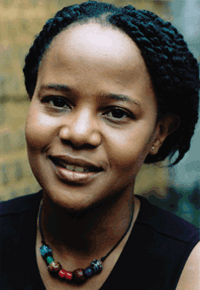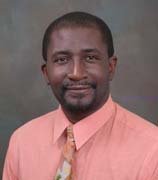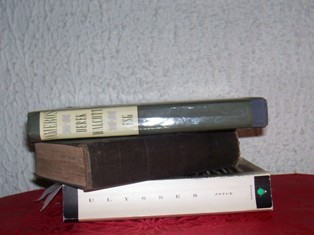When I first heard the song "Natty Dread," with
Bob Marley's revolutionary exhortation, "Children get your culture/ and don't stay there and jester," I knew I had a lot of work to do. For if I wanted to "follow my bliss" as
Joseph Campbell states in
The Power of Myth, there would be many challenges to overcome in order to pursue my vocation as a storyteller.
I grew up in
Mona Heights, Jamaica with my
mother--a single mom as they are now called--who was a truly Christian woman. I was surrounded by brothers, sisters, cousins, and friends of the family who passed through our home because my mother was the type of woman who would always try to help any child who was in need of help. I went to Seaward Primary where my mother worked as teacher and then moved to Mona Primary, passed my Common Entrance and went to
Jamaica College, an all boys' school modeled on the traditions of English boarding schools.
My love for
reading and writing showed up at an early age, and one of my primary school teachers at Mona Primary, Mrs. Pennycooke, once predicted that I would become lawyer based on my verbal skill and fictive abilities regarding my tardiness in school. "Mr. Philp," she said, "you bound to become a lawyer for you have you own way of looking at the truth." She was also impressed with my ability to recite whole sections from the Psalms and I was entered against my wishes in the annual festival competition in Jamaica where I won bronze and gold medals for recitation of poetry. When I took the medals home, my mother who didn't show any Christian modesty on this point, bragged to aunts, uncles and neighbors about me and was especially pleased that I was also continuing in my Bible studies.
For the Bible was the cornerstone of our family life. My mother was a lifelong seeker and student of religion. She was married as an Anglican and later converted to Jehovah's Witnesses. During this time, she accumulated many books on Rosicrucians and Mormons while sponsoring orphans in Africa. She was also a lover of the words. She instilled in me a love for reading and writing and she made me appreciate the value of words and the imagination. She made me realize that reading and writing involve the most sacred faculty of a human being--the imagination. My mother gave me the space to grow and to develop my talents as a writer and to expand my love for my craft--the rapture, excitement, and discovery that comes with writing. My mother did all this for me.
Yet for all the wonderful and courageous things my mother taught and did for me, she could not--no mother can-- teach me how to become a man. She could only show me one side of the equation, for which I am eternally grateful, but she could never help me to become a man without seriously maiming me-as some of my brothers have been maimed by their devouring mothers.
As a fatherless boy, I wanted to know, how does boy become a man? In my personal life, several mentors and role models such as
Melvyn Smith, Dennis Scott, and
Jimmy Carnegie helped me along the way, and my work as a poet, fiction writer and critic has been an exploration of this question of mentoring and manhood. For neither the African nor Europeans models really work in the Caribbean, and how we answer this question is of paramount importance given the historical decimation of the black family and black manhood. What values/ ideas of manhood are Caribbean people, individually and collectively, acting out either consciously or unconsciously?
This question is especially pertinent in fiction because a novel or short story is the about the clash of ideas—an attempt to consciously examine ideas through character and plot. The protagonist and antagonist in fiction embody certain ideas that will either triumph or fail. What do we mean when we say, "I love you"?
Given our history of slavery, colonialism, migration, and exile, how can we heal our individual, familial, and societal wounds? What are these wounds? What is the influence of
Rasta in all of this? How would Rasta affect the mentoring roles between men and boys? The gender roles between men and women? For Rasta upheld some of the most patriarchal and male chauvinistic ideas from the Old Testament which didn't match the reality of the women of the women I knew-women who were clearly capable, intelligent and sometimes to a powerless boy, formidable.
And then there was
Bob Marley and reggae. My mother loved Bob Marley's music--that is, until he became a Rastafarian and because of her religious beliefs, she stopped listening to him. I continued. But the only place I could listen to Bob Marley was at the homes of my older brother's friends. There I also learned at lot more than just listening to records. At Danny Morrison's house, I first heard
Last Poets and other truly progressive writers; at Michael Witter's, Hugh Masekela, and jazz;
Jah Mick's, Lee "Scratch Perry and hardcore dub. Reggae, and especially Wailers flavored reggae, became the means by which I interpreted the world.
Yet the older I got and the more I looked around, no one was willing to answer my questions. In my youthful ignorance, I didn't know that writers such as Kwame Dawes, Edwidge Danticat, and Colin Channer would be coming along. I'm a bit older than they are, so I can be forgiven my despair. I am not discounting the work of writers such as Oku Onoura, Mikey Smith,
Linton Kwesi Johnson, or Mutabaruka. But at the time, it seemed that they were still closely linked to the musical aspect of reggae. These writers also interpreted the world from a socially conscious, sometimes Marxist point of view. I was interested in a socially and politically conscious viewpoint, but I was never a Marxist and I wasn’t going to adopt a position with which I disagreed just to get published. A sense of outrage and anger also permeated their poems. This is not to say that the condition of black people was not and is not abominable. But what about joy? Is anger more important than joy? I would grow to learn as W. B. Yeats said in "Easter 1916": Too much sacrifice can make a stone of the heart."
For I was searching for a way to do what I heard in reggae, something that Kwame Dawes has explained in an
interview: [Reggae] allows us to explore the intensity of religious faith in a musical form that is at once politically conscious, historically aware and deeply and uncompromisingly sensual."As I saw it then and as I see it now, many of the writers and critics had failed us. For despite the work of writers such as
Derek Walcott,
Kamau Brathwaite, Una Marston, Dennis Scott,
Mervyn Morris,
Tony McNeill, V. S. Naipaul, Wilson Harris, Jean Rhys, Austin Clarke,
Orlando Patterson,
Roger Mais, Edgar Mittelholzer and
George Lamming, the epiphanies of Caribbean literature had not filtered through the culture to give us an accurate picture of ourselves.
We didn't have a literature that paid homage to the insights of these elder writers, but at the same time, maintained its own vision of the future. The work of many writers still lamented the effects of the slave trade, and, yes, we still suffer from its effects. But what about the scoundrels and politicians who, even now, are creating the Caribbean diaspora by their political warfare and mismanagement of their economies so that we've become wage slaves and economic slaves to the World Bank and IMF?
We believed and wrote narratives that portrayed us as the victims of history. When would we write stories that liberated us from such narrow vision of our past and ourselves? When would we write stories that portrayed us as shapers of our future and not merely passive agents in our own existence?
When would we begin to explore the philosophical implications of InI, perhaps one of the most interesting religious ideas to emerge from the Caribbean? We still buy and sell novels with characters that are locked into the stereotypes—characters who don’t look anything like us, but it’s what we’ve come to expect. When will we fill in the gaps in Caribbean life instead of remaining locked in a vision of outdated stereotypes?
It was a time of silence as
Colin Channer has noted in his keynote address at the Carifesta VII Conference in St Kitts. There was also silence concerning Caribbean sexuality, the treatment of Haitians and mother daughter relationships in Haiti. None of the issues were being dealt with until these writers came along. Indeed, there continues to be great deal of denial about these issues-a behavior that is neither healthy in life nor in literature.Many of our contemporary writers, critics, and publishers also continue to fail us by ignoring these issues by concentrating on the work of the elder writers, meta-fictions and deconstructions, and other cerebral word games and word play (for their own sake) that are brilliant, incisive, and useless. This may earn them kudos in Northern academic circles, but are superfluous to Caribbean life and letters because they are not reflecting the reality of Caribbean life.
The greatest challenge of any artist is to simply describe what's happening outside her window and many of our writers and critics are not doing this. We still have to fully develop an aesthetic that concentrates on Caribbean life the way the early novels of Naipaul, while admitting the outside world existed, focused on the lives of Caribbean people.
Why do I write? is an important question.
For whom do I write? is equally important.
Over these twenty-five years, I've realized I wasn't the only one trying to figure out these questions and in
Uncle Obadiah and the Alien,
xango music and
Benjamin, My Son, I explore these ideas. I also know that many of my contemporaries such as Kwame Dawes and Colin Channer are involved in asking similar questions, but from slightly different perspectives. Within Jamaica, we are the “Rasta/Reggae generation,” and given our individual backgrounds we are coming up with slightly different answers. One thing is clear however, these issues have shaped our lives and continue to shape our lives and all we are trying to do is to decipher the many meanings of all these events even as we grow and change our perspectives. But most of all, it's the deeply satisfying act of creating stories that keeps me going.
In
Natural Mysticism: Towards a Reggae Aesthetic,
Kwame Dawes notes that Bob Marley provided model for many young writers to write themselves into relevancy (42). I was one of those writers. Marley's example is useful and we will have to
suss out for ourselves our responses to these questions of audience and vocation. However, one thing has been clear to me from the start. I knew I would have to, given the faith of all my mother, teachers, mentors, friends and family, use all of my talents to become the best writer that I could ever become. If I remained true to that faith and trust, then being the man I wanted to be would be easy.
This essay was first published in Caribbean Tales.






